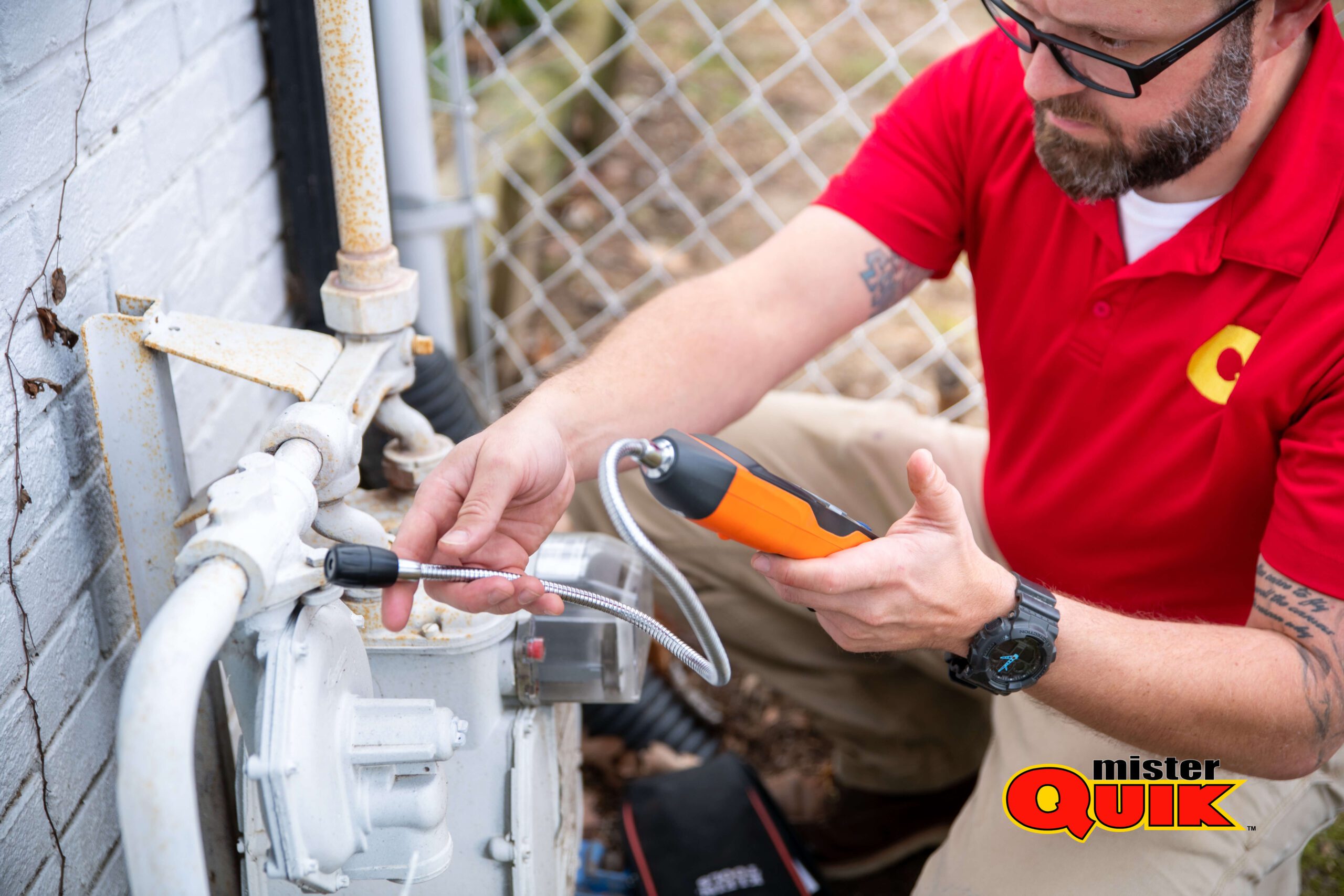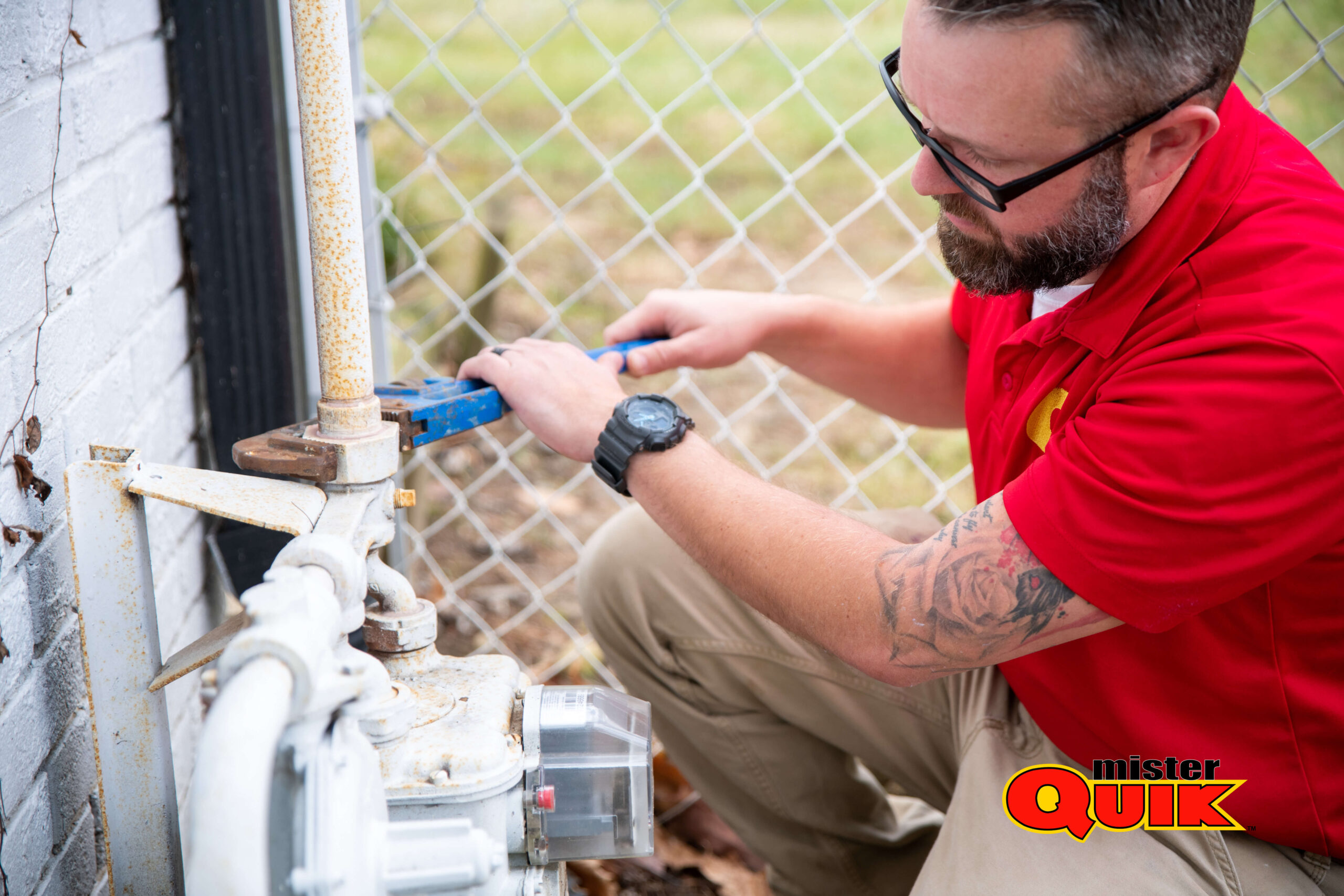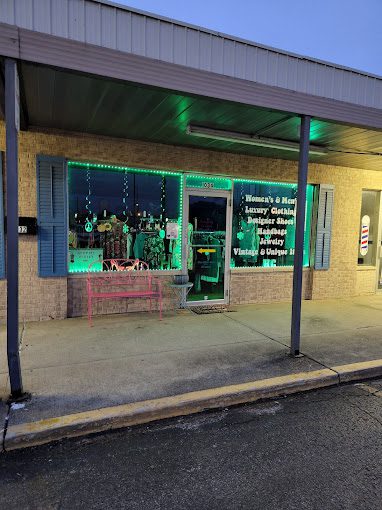Leaking Gas Lines Plumbing Near Me

Gas Leak Detector
Gas leak detectors are vital safety devices that help detect the presence of harmful gases like natural gas or propane in your home. Here’s what you need to know about gas leak detectors:
- How They Work: Gas leak detectors use sensors to detect the presence of gas in the air. When gas levels surpass a certain threshold, the detector triggers an alarm to alert occupants of potential danger.
- Types of Gas Detected: Gas leak detectors can detect various gases, including natural gas (methane), propane, carbon monoxide (CO), and hydrogen sulfide (H2S).
- Placement: Detectors should be installed near gas appliances, such as water heaters, furnaces, and stoves, as well as in areas where gas leaks are likely to occur, like basements or utility rooms.
- Power Source: Gas leak detectors can be powered by batteries or electricity, with some models offering both options for added reliability.
- Alarm Types: Detectors may emit audible alarms, visual indicators (such as flashing lights), or both to alert occupants of a gas leak.
- Sensitivity Levels: Some detectors allow users to adjust sensitivity levels to tailor detection capabilities to their specific needs.
- Maintenance: Regular maintenance, including testing the detector’s functionality and replacing batteries or expired sensors, is essential to ensure reliable operation.
- Importance of Testing: Testing gas leak detectors regularly using manufacturer-recommended methods helps verify their effectiveness and responsiveness.
- Emergency Response: In the event of a gas leak alarm, occupants should evacuate the premises immediately, ventilate the area, and contact emergency services and a qualified technician to address the issue promptly.
- Additional Safety Measures: While gas leak detectors are crucial, they should complement other safety measures, such as proper installation and maintenance of gas appliances, adequate ventilation, and awareness of gas safety protocols.
In conclusion, gas leak detectors play a crucial role in safeguarding your home against the dangers of gas leaks. By understanding how these devices work and following proper installation and maintenance practices, you can ensure the safety of your household. Trust Mister Quik Home Services in Brownsburg to provide expert guidance on gas safety and reliable detector installation to protect your family and property.
Minor Gas Leak Repair Cost
Encountering a minor gas leak in your home can be concerning, but understanding the potential cost of repair is essential for peace of mind. Let’s explore the factors that influence the cost of repairing a minor gas leak and what you can expect when addressing this issue.
The extent of the gas leak plays a significant role in determining the repair cost, with minor leaks typically being less expensive to fix.
The accessibility of the leak and its location within your home’s gas system can affect the complexity of the repair and associated costs.
Repair costs can vary depending on whether your home uses natural gas or propane, as well as the type of piping and fittings involved.
The cost of labor for professional repair services will depend on factors such as the time required to locate and fix the leak, as well as any necessary equipment or materials.
Replacement parts, such as valves, connectors, or piping, may be needed to repair the gas leak, contributing to the overall cost.
If the gas leak poses an immediate safety hazard, emergency repair services may be required, potentially resulting in higher costs.
Depending on local regulations, obtaining permits for gas leak repairs may incur additional fees.
Hiring a licensed plumber or gas technician to conduct a thorough inspection and repair ensures the leak is properly addressed, minimizing the risk of future issues.
Consider investing in preventive maintenance services, such as regular gas system inspections, to identify and address potential leaks before they escalate.
In conclusion, while the cost of repairing a minor gas leak can vary depending on several factors, prompt attention to the issue is essential for safety and peace of mind. Trust Mister Quik Home Services in Brownsburg to provide expert gas leak repair services at competitive prices, ensuring the integrity of your home's gas system.
If your gas pipe is leaking, the first step is to evacuate the area immediately and ensure there are no open flames or sources of ignition nearby. Next, ventilate the area by opening windows and doors to allow gas to dissipate safely. Avoid using any electrical appliances, including light switches, as they can create sparks that may ignite the gas. Once you are at a safe distance, contact your gas provider and emergency services to report the leak and seek professional assistance. It’s crucial to refrain from attempting to fix the leak yourself, as this can be extremely dangerous and should only be handled by trained professionals.
While plumbers are skilled in working with pipes and fittings for water systems, fixing a gas leak typically falls within the expertise of a licensed gas fitter or a professional trained in handling gas-related issues. Gas leaks pose serious safety risks, including fire and explosion hazards, so it’s crucial to have someone with the appropriate qualifications and experience address such issues. Hiring a certified professional ensures that the leak is accurately diagnosed, safely repaired, and complies with relevant regulations to safeguard both property and lives.
When a gas pipeline leaks, it poses serious environmental and safety risks. The leaked gas can contaminate soil, water sources, and the atmosphere, leading to potential health hazards and ecological damage. Additionally, gas leaks can be highly flammable, increasing the risk of fires or explosions, especially in enclosed spaces. Immediate detection and repair of gas leaks are crucial to mitigate these risks and ensure the safety of nearby communities and the environment.
The time it takes to repair a gas pipe leak can vary depending on factors such as the severity of the leak, accessibility of the pipe, and the expertise of the technicians involved. Minor leaks might be resolved relatively quickly, often within a few hours, while more complex issues requiring extensive repairs could take several days to rectify. Additionally, factors such as obtaining necessary permits, coordinating with utility companies, and ensuring safety protocols are followed can also influence the duration of the repair process. It’s crucial to address gas pipe leaks promptly to mitigate potential hazards and ensure the safety of occupants and the surrounding area.
Who to Call for Gas Leak Repair?
Experiencing a gas leak can be alarming, posing serious safety risks to your home and family. Knowing who to call for gas leak repair is crucial for addressing the issue promptly and ensuring the safety of your household. Here’s a comprehensive guide to help you understand who to contact and what steps to take in the event of a gas leak:


If you suspect a gas leak in your home, prioritize safety and evacuate the premises immediately.
- Dial emergency services or 911 to report the gas leak and request assistance from trained professionals.
- Avoid using any electronic devices, lights, or appliances, as they can generate sparks that may ignite the gas.
Contact your local gas company or utility provider to report the gas leak and request emergency service.
- Gas companies have trained technicians equipped to handle gas leaks safely and efficiently.
- Provide essential information such as your address, the nature of the gas odor, and any observed signs of a leak.
In some cases, a licensed plumber may be called to assess and repair the gas leak, especially if it originates from a gas line or appliance within your home.
- Plumbers with experience in gas line installation and repair can identify and address leaks in a timely manner.
- Ensure the plumber is certified and equipped to work with gas lines to prevent further safety hazards.
If the gas leak is associated with a gas furnace or heating system, contacting an HVAC technician specializing in gas appliances may be necessary.
- HVAC technicians can inspect and repair gas furnaces, boilers, and other heating equipment to resolve the leak.
- Choose a reputable HVAC company with certified technicians to ensure proper diagnosis and repair of the gas leak.
Consider hiring a professional gas leak detection service to pinpoint the source of the leak accurately.
- Gas leak detection specialists use advanced equipment such as gas detectors and infrared technology to identify leaks quickly and efficiently.
- This option may be beneficial if the gas leak is challenging to locate or if you want to ensure comprehensive detection and repair.
In conclusion, knowing who to call for gas leak repair is essential for protecting your home and loved ones from the dangers associated with gas leaks. By following these guidelines and contacting the appropriate professionals, you can address gas leaks promptly and ensure the safety and integrity of your gas system. Trust Mister Quik Home Services in Brownsburg to provide expert assistance and peace of mind for all your gas leak repair needs
How Do You Test Gas Lines for Leaks?
Testing gas lines for leaks is crucial for ensuring safety in your home. By following proper procedures, you can detect any leaks early and prevent potential hazards. Let’s explore the steps involved in testing gas lines for leaks:









Mix dish soap with water to create a solution that will help detect gas leaks by producing bubbles when applied to suspected areas.









Using a brush or sponge, apply the soapy water solution to all connections, fittings, and joints along the gas lines, including valves and regulators









Watch closely for any bubbles forming on the surface of the soapy water, as this indicates a gas leak. Pay particular attention to areas where bubbles persist or grow in size.









Alternatively, you can use a handheld gas leak detector, commonly available at hardware stores, to identify leaks more accurately.









If applicable, ensure that all pilot lights on gas appliances are extinguished before testing for leaks, as they can interfere with the detection process.









After applying the soapy water solution, observe the gas meter for any signs of movement, which could indicate a leak in the gas lines









If you detect any leaks during the testing process, immediately shut off the gas supply and contact a licensed plumber or gas technician to repair the issue.









Regularly inspect gas lines for leaks, especially after any maintenance work or changes to the gas system, to ensure ongoing safety.
In conclusion, testing gas lines for leaks is a crucial step in maintaining a safe home environment. By following proper procedures and being vigilant for signs of gas leaks, you can protect your household from potential hazards. Trust Mister Quik Home Services in Brownsburg to provide expert assistance and ensure the safety and integrity of your gas lines.
Gas Leak Signs and What to Do
Experiencing a gas leak can be dangerous, but knowing the signs and what to do can save lives. Here are some crucial signs of a gas leak and steps to take if you suspect one:
- Rotten Egg Odor: Gas companies add a distinctive odor to natural gas to help detect leaks. If you smell rotten eggs or sulfur, it could indicate a gas leak.
- Hissing Sounds: A hissing or whistling sound near a gas line or appliance can suggest a leak.
- Visible Damage: Look for physical damage to gas lines, connections, or appliances, such as rust, corrosion, or dents.
- Dead Plants: If indoor plants start wilting or dying unexpectedly, it could be due to exposure to a gas leak.
- Nausea or Dizziness: Gas leaks can cause symptoms like nausea, dizziness, headaches, or fatigue, especially in enclosed spaces.
- Increased Gas Bills: A sudden spike in your gas bill without an increase in usage could indicate a leak.
- Bubbles in Water: If you notice bubbles in standing water near a gas line or appliance, it could indicate a leak.
- Pets Acting Unusual: Animals may exhibit unusual behavior, such as lethargy or vomiting, in the presence of a gas leak.
- Yellow Flames: Check the flame color on gas appliances like stoves or water heaters. A yellow or orange flame instead of blue could indicate a problem.
- Air Quality Monitor Alarms: Some modern homes have air quality monitors that can detect gas leaks and trigger alarms.
If you suspect a gas leak, follow these steps immediately:
- Evacuate: Leave the area immediately and ensure everyone else does too, including pets.
- Do Not Use Electronics: Avoid using anything that could create a spark, such as light switches, phones, or appliances.
- Open Windows and Doors: If safe to do so, open windows and doors to ventilate the area and let the gas dissipate.
- Shut Off Gas: If you can do so safely, shut off the main gas supply valve to your home.
- Call for Help: Contact your gas company or emergency services from a safe location outside the affected area. Do not return until authorities deem it safe.
In conclusion, recognizing the signs of a gas leak and knowing what to do can prevent accidents and ensure the safety of you and your loved ones. Trust Mister Quik Home Services in Brownsburg to provide expert assistance and solutions for gas-related issues, keeping your home safe and secure.
Why is My Gas Leaking?
Discovering a gas leak in your home can be a cause for concern, but understanding why it’s happening is crucial for your safety. Let’s explore the possible reasons behind gas leaks and what steps you should take to address them effectively.
Aging or improperly maintained gas appliances such as stoves, water heaters, furnaces, or boilers can develop leaks over time due to wear and tear on gas lines or faulty connections.
External factors like corrosion, physical damage from construction work, or natural disasters can damage underground or exposed gas lines, leading to leaks.
Loose fittings or connections in gas lines, valves, or appliances can allow gas to escape, posing a significant safety risk.
Improper installation of gas appliances or piping by unqualified individuals can result in leaks, underscoring the importance of professional installation.
:Over time, sealants used in gas fittings or joints can degrade, compromising their ability to prevent gas leakage.
Sudden changes in gas pressure within the supply lines, often caused by issues with the gas regulator or supply system, can lead to leaks.
High gas usage or demand exceeding the capacity of the gas supply system can cause leaks to occur, especially in older or poorly maintained systems.
Extreme temperatures, ground shifts, or seismic activity can affect gas lines and cause them to rupture or develop leaks.
Exposure to certain chemicals or solvents near gas lines or appliances can corrode materials, increasing the likelihood of leaks.
While natural gas is odorless, utility companies add a distinctive odorant called mercaptan to help detect leaks more easily.
In conclusion, identifying the cause of a gas leak is essential for taking prompt and appropriate action to mitigate the risk and ensure the safety of your household. If you suspect a gas leak, evacuate the premises immediately and contact emergency services. Trust Mister Quik Home Services in Brownsburg to provide expert assistance in detecting and resolving gas leaks, safeguarding your home and family from potential hazards.
Troubleshoot Checklist:
- Use a gas leak detector to identify gas presence.
- Regularly test detectors for functionality
- Check for visible damage or hissing sounds.
- Monitor gas bills for unusual spikes.
- Immediately evacuate if a leak is suspected.
- Avoid using electronics and open windows for ventilation.
- Locate and turn off the main gas supply valve.
- Only shut off gas if it can be done safely.
- Call emergency services or gas company.
- Consult a licensed plumber or gas technician for repairs.









